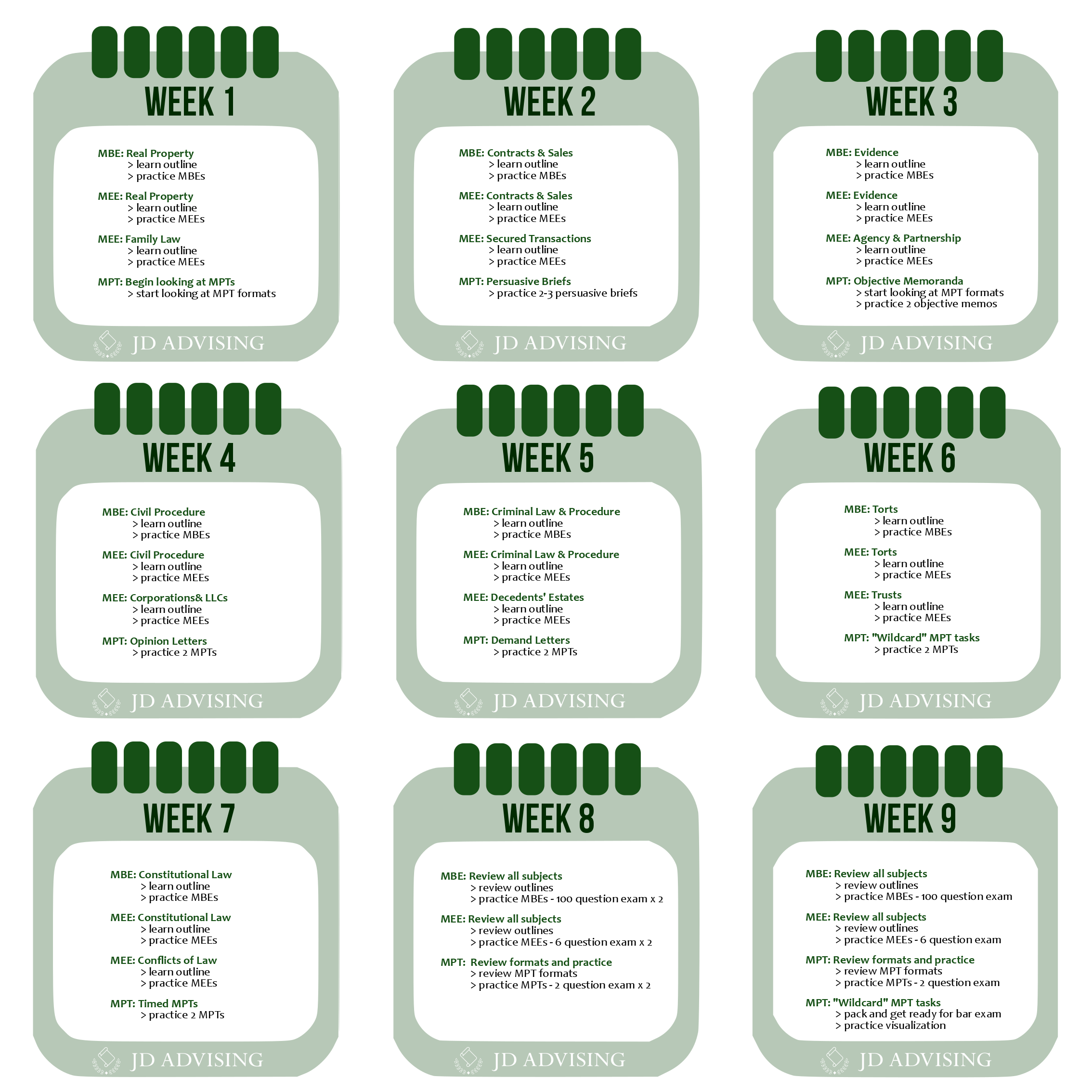How to Make an Effective Uniform Bar Exam Study Schedule and Plan—for Repeat Takers
 How to Make an Effective Uniform Bar Exam Study Schedule and Plan—for Repeat Takers
How to Make an Effective Uniform Bar Exam Study Schedule and Plan—for Repeat Takers
Now that you have dissected your Uniform Bar Exam (UBE) score report, read about four common reasons that examinees fail the Uniform Bar Exam, reflected on your last bar exam attempt, and came up with some ideas that you want to include in your study plan, it is time to come up with a study schedule to pass the Uniform Bar Exam the next administration.
After all, you can spend time coming up with a lot of great ideas about how to improve. But, if you never take steps to come up with a plan that ensures you actually follow through with these ideas, then the ideas will remain just ideas. We want to turn ideas into action.
Further, a Uniform Bar Exam study schedule has other benefits: it gives you a sense of control and confidence. It will relieve some of the awful feelings that come with failing the bar exam. It decreases stress. And, it makes it more likely that you will pass the bar exam.
Here, we tell you how to make a Uniform Bar Exam study schedule as a repeat taker. Your schedule will not look the same as the Uniform Bar Exam study schedule for first-time takers. You probably won’t be rewatching all of those Barbri lectures. And, you may have to work full time. You also know what didn’t work last time and you have insight that first-time takers don’t have. Your personal circumstances, and what you have learned from failing the bar exam, can all be included in your UBE study schedule.
How to Make an Effective Uniform Bar Exam Study Schedule and Plan—for Repeat Takers
Below, we list several steps to follow to determine how to make a Uniform Bar Exam study schedule that is tailored to you. It is helpful to have a blank calendar in front of you so you can start making your study schedule immediately.
Note: if part of your study schedule includes bar exam private tutoring or signing up for our Uniform Bar Exam Full-Service Course, please contact us first! We will be able to give you insight tailored to you and specific to the course sessions.
1. Figure out when you are going to start studying for the bar exam.
The mock schedule that we have posted above (and below) assumes that you will start studying for the bar exam about nine weeks early. However, if you are making a Uniform Bar Exam study schedule as a repeat taker, you may want to start a little earlier if possible. (We understand you may have just received results and it may not be possible. But if it is, then start even earlier than nine weeks).
It is especially important for you to start your UBE study schedule earlier than nine weeks if:
- Your score was far from passing (or, you have already failed the bar exam multiple times).
- you have full-time obligations, such as work or child care.
We start our February Uniform Bar Exam course in November (and we meet three times a week). This allows students to start a month earlier than traditional courses. And, it gives students a month to review at the end (see next step!). Even if you are not in our course, we have found this to be very effective and you should aim to implement something similar into your study schedule if possible.
If you just found out you failed the bar exam, and your personal calendar is very busy in the next few months, or if you are feeling extremely burnt out, you may want to consider skipping a bar exam so that you can study right for the next exam (we write more about that here).
2. Figure out when you want to stop learning new material so that you can do a major review of all of the subjects.
Most examinees prefer to have at least two weeks before the bar exam to review all the material they have learned. However, if you are starting early, you may wish to have even more time. You may want three or even four weeks at the end to review subjects, take timed exams, catch up, and make sure you are set to take the bar exam. (Our UBE Course students love having a full month to review at the end of bar prep.)
A few notes on this:
- You don’t want to start memorizing during your review period. You should be memorizing every week (as noted below). Review period is for reviewing and taking timed exams.
- If you are stretching out your study schedule over several months (e.g., five months or more), you will probably find it helpful to incorporate “review weeks” into your schedule—e.g., every four or six weeks, take a few days or a week simply to review everything you have done and take timed exams. This is an effective and efficient approach to bar exam preparation because you will be more likely to retain the information you have worked so hard to learn.
3. Fill in the weeks between your start and end date. Begin with the idea that you will cover one major Multistate Bar Exam (MBE) subject per week.
We tell our first-time Uniform Bar Exam takers that if they have nine weeks to study, they should use about seven of them to cover the seven MBE subjects.
However, as a UBE repeat taker, you may instantly want to tweak this, and you should. Perhaps you really did not review Civil Procedure for the last exam. Or perhaps you really struggle with Real Property and Contracts (but you excelled in Criminal Law and Torts). If this is the case, you may want to spend, say, 1.5 weeks on Real Property and Contracts. And, you may want to combine Criminal Law and Torts in the same week.
Remember that the Multistate Bar Exam subjects are:
- Contracts and Sales
- Civil Procedure
- Constitutional Law
- Criminal Law and Procedure
- Real Property
- Evidence
- Torts
The goal is to have an effective Uniform Bar Exam study schedule that is tailored to you! So, tailor it to your needs in a way that will help you pass!
4. Add at least one essay-specific subject to cover each week.
The Multistate Essay Exam (MEE) subjects include all of the MBE subjects (above) plus the following:
- Agency and Partnership
- Corporations and LLCs
- Decedent’s Estates (Wills)
- Trusts
- Conflict of Laws
- Secured Transactions
- Family Law
So, review at least one of these subjects each week. (This means, study your outlines and complete practice problems that cover these subjects, as we note below.)
It is also a good idea to try to combine highly-tested subjects with less-tested subjects and your most difficult topics with topics that are easier for you. For example, if you love Torts, but are very uncomfortable with Secured Transactions, you could try to cover them both in the same week. That would make it more manageable than covering a difficult MBE topic at the same time that you cover a difficult MEE subject.
Now that you have seen all of these subjects once, you will likely have a decent idea of which subjects you struggle with and which ones you excel in.
5. Start practicing Multistate Performance Test (MPT) problems early and often!
The MPT portion of the bar exam is worth 20% of your score. Whether you struggled with the MPTs or excelled on them the last exam, you still want to incorporate MPT practice into your schedule from the beginning.
If you completely ignored the MPT portion last administration, you will want to dedicate more time to MPTs this time around. Make them a priority right from Week One of your study schedule. If you did practice MPTs last administration and did well on them, then you may not need as much practice, but you still want to include MPT practice into your schedule early and often so that you can maintain—and even improve—your skills when it comes to answering MPT questions.
Students who take the UBE don’t realize what a huge advantage they are at if they practice MPTs! If you think you may be one to procrastinate on MPTs, please read this post on why to take the MPT very seriously!
6. During the last month, make sure you have perfected your timing and that you are ready to go.
Take timed exams
Plan on taking entire exams—take both multiple-choice exams and essay exams. Simulate exam conditions. If timing was one of the reasons that you failed the bar exam the last time, you will want to incorporate even more timed exams into your schedule. You should start from the beginning and take one-hour timed exams (answering two essays or 33 multiple choice questions). Move it up to two hours the next week. Then three hours. This will not only build your timing skills but it will also build your confidence. Further, it will make it more likely that you will pass the bar exam.
Get prepared
Pack. Practice visualization before the bar exam. Do whatever you need to do to get into a positive mindset.
If you think anxiety or stress played a role in why you failed the bar exam, make sure to incorporate meditation, therapy, or seeking outside help into your schedule from the beginning. If you are anxious, your studying will not be effective.
7. Carefully review the notes you made during your period of reflection.
Now that you have a skeleton Uniform Bar Exam study schedule in place, it is time to review the notes you made during your period of reflection about why you failed. Add appropriate items to your calendar.
For example:
- If you need to take time off work, add it to your calendar to talk to your boss this week about taking time off work.
- If you did not use real MBE questions. Add it to your calendar to purchase real MBE questions at the beginning of your bar exam preparation so you are ready to go.
- If you have too many “life” tasks in the way of studying, add it to your calendar to make a list of chores, tasks, or errands that family members or friends could help you with. Then set up an afternoon to touch base with them and enlist their help. This afternoon will save you a lot of time moving forward!
- If you did not focus on the highly tested areas of law, make sure you add in your calendar to “review highly tested topics” each week. You should review these at the beginning of the week so that you can focus effectively on them all week. The highly tested MEE topics are here and the highly tested MBE topics are here.
- If you are intimidated by MPTs, consider a new approach. (We have a TON of free MPT posts here.) Maybe add it to your schedule to peruse posts at a certain time each week so that you are less intimidated by the MPT portion.
- If you did not practice any essays or MPTs last time, add a specific measurable amount to practice each day. And, do it in the morning before anything can distract you! For example, practice two MEEs per day Monday through Thursday and an MPT on Friday and Saturday. Having something to check off your list is much better than having a vague idea that you will one day practice writing answers to essays and MPTs.
These are just some examples.
When you turn your notes into concrete items on your Uniform Bar Exam study schedule, you will want to make sure you do a few things:
- Pick specific dates you will accomplish tasks. This makes it more likely you will do them.
- Make sure whatever you write down is measurable. For example, don’t write “practice MPTs,” write down: “practice two MPTs” or (even better) “practice two objective memo MPTs.”
- Be realistic. Don’t plan on studying eight hours a day if you are working eight hours a day as well. If your plan is not realistic, you might as well not even have a plan.
8. Remember to take breaks.
If you are a repeat taker, you have the special problem of perhaps feeling the following emotions to a great degree:
- Burnt out
- Overwhelmed
- Stressed out or anxious
- Extra pressure to pass the exam
Remember to take some breaks. Exercise. Sleep. Take care of your mental health. You should add this right into your Uniform Bar Exam study schedule. It is even more important than studying. If you are not mentally in the right place to take the exam, you will likely be ineffective when you study and you are less likely to pass the exam. Further, your mental health is more important than the bar exam!
Example of a Weekly UBE Bar Exam Study Schedule for Repeat Takers
This is an overview of what your Uniform Bar Exam study schedule for might look like (minus the personal touches you will add to your own):
Week one
MBE subject 1: Real Property
MEE subject: Real Property
MEE subject: Family Law
MPT: start looking at different kinds of MPTs
Week two
MBE subject 2: Contracts and Sales
State subject: Contracts and Sales
State subject: Secured Transactions
MPT: practice persuasive briefs
Week three
MBE subject 3: Evidence
MEE subject: Evidence
MEE subject: Agency and Partnership
MPT: practice objective memoranda
Week four
MBE subject 4: Civil Procedure
MEE subject: Civil Procedure
MEE subject: Corporations and LLCs
MPT: practice opinion letters
Week five
MBE subject 5: Criminal Law and Criminal Procedure
MEE subject: Criminal Law and Criminal Procedure
MEE subject: Decedents’ Estates
MPT: practice demand letters
Week six
MBE subject 6: Torts
MEE subject: Torts
MEE subject: Trusts
MPT: practice unusual MPT tasks
MPT: timed MPT (complete one)
*TAKE FULL ESSAY EXAM
Week seven
MBE subject 7: Constitutional Law
MEE subject: Constitutional Law
MEE subject: Conflict of Laws
MPT: timed MPT (complete two)
*TAKE FULL MBE EXAM and ESSAY EXAM
Weeks eight and nine
Review all subjects these two weeks
*TAKE FULL EXAMS
Pack for the bar exam
What Should My Daily Bar Exam Study Schedule Look like?
Having a daily routine is crucial to succeeding on the bar exam. You need to put in the time, but you don’t need to (and shouldn’t aim to!) study 14 hours a day! If you are not working, it is a good idea to make bar exam studying your full-time job. If you are working or have other substantial obligations, you will have to find as much time as you can on weeknights and weekends.
Generally speaking, there are a few things you need to do to perform well on the bar exam.
You should keep these things in mind when creating your Uniform Bar Exam daily schedule:
- First, you need good materials. If you hate your outlines, then the bar exam is going to be a struggle right from the beginning. Find outlines that are logical, easy to learn, and tailored to the bar exam. Note: when you reflected on why you didn’t pass the UBE the first time, if this was one of the reasons, make sure you get good materials right from the beginning!
- Second, you need to understand the substantive law. If you do not understand how the law works, it will be very hard to memorize it and apply it. Note: If you do not feel as though you are understanding the law, you may want to consider a course or private tutoring. This is the most efficient way to gain an understanding of the law.
- Next, you need to memorize the substantive law. It is not enough to “get how it works when you see it.” You need to know it cold. The best way to do this is to go through your outlines several times and make sure that you know them. Some students also have other ways of memorizing it (e.g., flash cards, making diagrams, etc.). Do what works for you. Note: If you struggle with memorization, check out these tips on memorizing your bar exam outlines. Make memorization something that you do early in the morning or whenever your brain works best. It is difficult to memorize, but if you make it a priority and do it during your best time then it won’t seem that difficult.
- Lastly, you need to apply the law. This means doing practice multiple-choice questions and essay questions. Focus more on quality when you answer questions, rather than quantity (to see what we mean, read this post on a step-by-step guide to improving your multiple-choice score).
Thus, when you study for both the MBE and essay subjects, it is important to spend a good portion of your time understanding and learning the law and a good portion of your time answering practice questions. Indeed, the bar exam tests whether you know the law and are able to apply it.
Make sure that you are spending your time appropriately. Start to reflect every week on what is working and what isn’t. (You don’t need to fail a bar exam to engage in meaningful reflection!) If anything you are doing does not further your understanding, memorization, or application of the law, don’t do it! (For example, if you get nothing out of lectures, stop watching them!) You need to spend your time as efficiently as possible.
Example of a Daily Bar Exam Study Schedule
If you are planning on studying eight hours a day, your day might look like this:
- 9:00 a.m.–11:00 a.m.: learning the law (lecture, private tutor, or going through your outlines slowly)
- (11:00–11:30: break)
- 11:30 a.m.–1:30 p.m.: learning your outline (memorizing it!)
- 1:30 a.m.–3:00 a.m.: practice multiple-choice questions for the subject(s) you reviewed
- (3:00 p.m.–3:30 p.m.: break)
- 3:30 p.m.–5:30 p.m.: practice essay questions for the subject(s) you reviewed; practice MPTs
- 5:30 p.m.–6:30 p.m.: review your outlines again (or work on whatever you think you need to work on during this time)
Note: If you find you struggle with a certain area (like understanding the law) you can tweak your schedule accordingly. If you start early, you will give yourself a cushion to do everything you need to do in a short amount of time.
Go to the next topic, Step 7: Review Tips on How to Pass the Bar Exam While Working Full Time.
Looking to Pass the Bar Exam?
Free Resources:
- 🌟Bar Exam Free Resource Center: Access our most popular free guides, webinars, and resources to set you on the path to success.
- Free Bar Exam Guides: Expert advice on the MBE, the MEE, passing strategies, and overcoming failure.
- Free Webinars: Get insight from top bar exam experts to ace your preparation.
Paid Resources:
- 🏆One-Sheets: Our most popular product! Master the Bar Exam with these five-star rated essentials.
- Bar Exam Outlines: Our comprehensive and condensed bar exam outlines present key information in an organized, easy-to-digest layout.
- Exclusive Mastery Classes: Dive deep into highly tested areas of the MBE, MEE, MPT, and CA bar exams in these live, one-time events.
- Specialized Private Tutoring: With years of experience under our belt, our experts provide personalized guidance to ensure you excel.
- Bar Exam Courses: On Demand and Premium options tailored to your needs.
- Bar Exam Crash Course + Mini Outlines: A great review of the topics you need to know!
🔥 NEW! Check out our Repeat Taker Bar Exam Course and our new premier Guarantee Pass Program!






Leave a Reply
Want to join the discussion?Feel free to contribute!